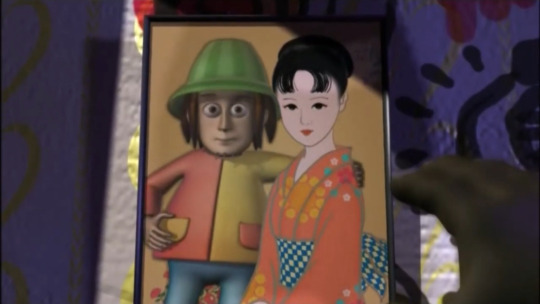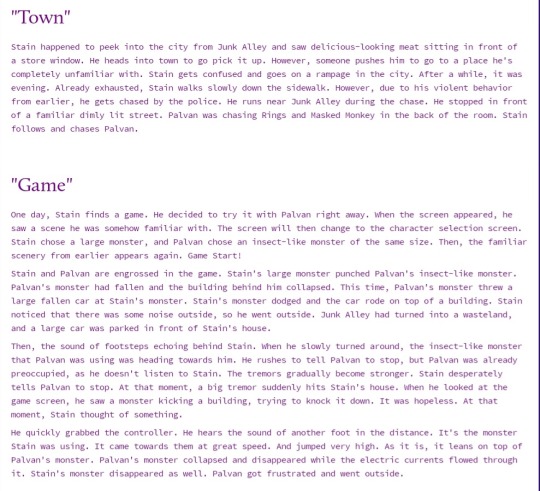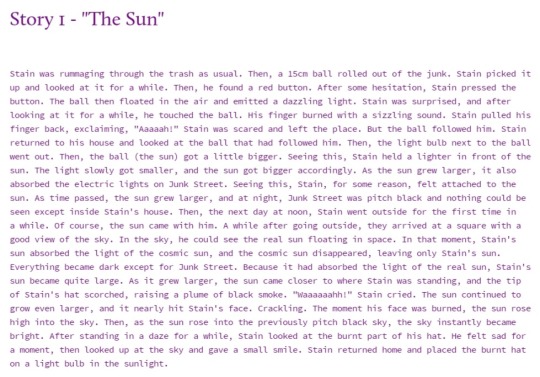#ga-ra-ku-ta
Explore tagged Tumblr posts
Text
Self inserts be like

#meme#ga-ra-ku-ta#mr. stain#ga ra ku ta: mr. stain on junk alley#garakuta: mr. stain on junk alley#mr. stain on junk alley#garakuta doori no stain#garakuta#増田龍治#増田若子#ガラクタ 通 り の ステイン#masudaverse memes#masudaversememes#masudaverse#wakako masuda#ryuji masuda#masudameme#masudamemes#masuda#self insert
14 notes
·
View notes
Text

Yep. It's one of those days, isn't it?
#mr stain on junk alley#mrstain#mr stain#mrstainonjunkalley#garakuta mr stain on junk alley#mr. stain#garakutadoorinostain#garakuta#GA-RA-KU-TA#GA-RA-KU-TA Mr. Stain on Junk Alley#drive car#ryuji masuda#drive car ryuji masuda#20th anniversary#edit thing
1 note
·
View note
Text

Hi guys
#art#artists on tumblr#wav3y#digital art#smile for me#smile for me fanart#trevor garbo#ga ra ku ta mr. stain on junk alley#mr. stain on junk alley#dr steel#regretevator#regretavator infected#ruby gloom#alastor#hazbin hotel#sweet bro and hella jeff#homestuck
91 notes
·
View notes
Text
Cringetober day 1: Screenshot Redraw !! :3

I'm kinda late bcuz of school + I wanted to do more detailed drawings but I've already taken care of the school stuff and I decided to do simple drawings / doodles which are more fun to me so I hope I'm able to do the rest of the days that I missed (^^)

#mr. stain on junk alley#Ga-Ra-Ku-Ta Mr. Stain on Junk Alley#Garakuta mr. Stain On Junk Alley#Palvan#ガラクタ通りのステイン#Ryuji Masuda#増田 龍治#Wakako Masuda#増田若子#Masudaverse#Redraw#cringetober#cringetober 2024#Doodle#simple drawing#Ibis Paint#Ibis paint x#lighting practice#FranOewm#Day 1#day one#My art
13 notes
·
View notes
Text
Mr. Stain on Junk Alley (2003)

#out of context#no context#ga ra ku ta: mr. stain on junk alley#mr. stain on junk alley#ガラクタ 通 り の ステイン#増田作品#garakuta: mr. stain on junk alley#mr. stain#garakuta#garakuta doori no stain#ga ra ku ta#masudaverse#no context masudaverse#out of context masudaverse
2 notes
·
View notes
Text


#charady#charadysdailyjoke#bathbuta#chobotan#charady’s daily joke#charady no joke na mainichi#charadynojokenamainichi#キャラディのジョークな毎日#bath buta charady's daily joke#chobotan charady's daily joke#bath buta#words of wisdom#私の可愛さを思い知れ#増田龍治#増田若子#wakako masuda#masudaverse#ryuji masuda#ga ra ku ta: mr. stain on junk alley#mr. stain on junk alley#garakuta: mr. stain on junk alley#mr. stain#ga ra ku ta#garakuta doori no stain#garakuta#garakutadoorinostain#ガラクタ 通 り の ステイン
8 notes
·
View notes
Text
Canceled Mr. Stain on Junk Alley (2003) Episodes




#ガラクタ 通 り の ステイン#ガラクタ通りの ステイン#ryuji masuda#wakako masuda#masudaverse#masudamedia#ga ra ku ta mr. stain on junk alley#ga ra ku ta mr stain on junk alley#ga ra ku ta: mr stain on junk alley#garakuta mr stain on junk alley#ga ra ku ta: mr. stain on junk alley#garakuta mr. stain on junk alley#mr stain#garakuta: mr stain on junk alley#mr stain on junk alley#mr. stain#mr stain on junk alley palvan#mr. stain on junk alley#mrstain#mrstainonjunkalley#garakuta doori no stain#garakuta#garakutadoorinostain#ga ra ku ta
11 notes
·
View notes
Text
~ Handsome Stain: New Batch ~










#mr stain#handsomeboi#mr stain on junk alley#ga ra ku ta mr. stain on junk alley#handsome stain#ga ra ku ta#mr. stain#mrstain#handsomestain#ga ra ku ta: mr. stain on junk alley#mrstainonjunkalley#mr. stain on junk alley#ga ra ku ta: mr stain on junk alley#garakuta mr stain on junk alley#ga ra ku ta mr stain on junk alley#garakuta: mr stain on junk alley#garakuta: mr. stain on junk alley#garakuta mr. stain on junk alley#mr stain on junk alley lifa#garakuta doori no stain#garakuta#garakutadoorinostain#私の可愛さを思い知れ#増田龍治#増田若子#ガラクタ 通 り の ステイン#ガラクタ通りの ステイン#masudaverse#ryuji masuda#wakako masuda
7 notes
·
View notes
Text
3️⃣9️⃣ Russian Expressions for Discussion and Debate 💬
Here’s a comprehensive list of Russian phrases for discussions, arguments, and debates. Perfect for refining your fluency, impressing your friends, or diving into deep conversations! 🗣✨
🗨️ Main Expressions
Why? Зачем? [za-chem]
Let's step back a little bit. Давайте оставим эту тему. [da-vai-te a-sta-vim e-tu te-mu]
Let's see. Давай разберёмся. [da-vai raz-be-ryom-sya]
Of what you speak? О чём ты говоришь? [a chyom ty ga-vo-rish?
Where are you going with this? К чему ты клонишь? [k che-mu ty klo-nish]
Your question is not relevant to the subject. Ваш вопрос не относится к теме. [vash va-pros ne ot-no-sit-sya k te-me]
That proves nothing. Это ничего не доказывает. [e-ta ni-che-vo ne do-ka-zy-va-et]
That's pretty good, but… Это всё очень хорошо, но… [e-ta vsyo o-chen' ha-ra-sho, no…]
Well, what is it? Ну и что же это? [nu i chto zhe e-ta?
Believe you me! Можешь мне поверить! [mo-zhesh mnye pa-ve-rit']
💡 Practical Phrases
So what about it? И что из этого? [i chto iz e-ta-va]
I don't know. Понятия не имею. [pa-nyat-ya ne i-me-yu]
I'd like to know. Хотел бы я знать. [ho-tyel by ya znat']
I don't care. Меня не волнует. [me-nya ne vol-nu-et]
It doesn't matter. Это не важно. [e-ta ne vazh-na]
I don't care. Мне без разницы. [mnye bez raz-ni-tsy]
That's up to you. Решай сам. [re-shai sam]
It's none of your business! Не твое дело! [ne tva-yo dye-la]
Mind your own business. Занимайся своим делом. [za-ni-mai-sya svo-im dye-lom]
I don't know. Не знаю. [ne zna-yu]
❗ Emotional Reactions
This is inappropriate. Это неуместно. [e-ta ne-u-mes-tna]
This is a waste of time. Это трата времени. [e-ta tra-ta vre-me-ni]
It's a lie. Это ложь. [e-ta lozh]
It doesn't make sense. Это не имеет смысла. [e-ta ne i-me-yet smys-la]
It's the first time I've heard. Первый раз слышу. [pyer-vyy raz sly-shu]
That's enough about that. Довольно об этом. [da-vol-na ab e-tam]
I'm serious! Я серьёзно! [ya se-r'yoz-na!]
📖 More Advanced Phrases
I disagree. Я не согласен/согласна. [ya ne sa-gla-sen/sa-gla-sna]
Let's look at it from another perspective. Давайте посмотрим на это с другой стороны. [da-vai-te pos-mo-trim na e-ta s dru-goj sto-ra-nyi]
This is a controversial question. Это спорный вопрос. [e-ta spor-nyy va-pros]
I need to think this over. Мне нужно обдумать это. [mnye nu-zhnah ab-du-mat' e-ta]
Let me explain my point of view. Позвольте мне объяснить свою точку зрения. [poz-vol-te mnye ob-yas-nit' svo-yoo toch-ku zre-ni-ya]
It's not so straightforward here. Тут всё не так однозначно. [tut vsyo ne tak od-no-znach-na]
What do you propose to solve this? А как вы предполагаете решить это? [a kak vy pred-pa-la-gai-ye te re-shit' e-ta]
Let’s get back to the point. Давайте вернёмся к сути. [da-vai-te ver-nyom-sya k su-ti]
It seems to me you're missing the point. Мне кажется, вы упускаете суть. [mnye ka-zhets-ya, vy up-pus-ka-yet-ye su-t]
That’s not entirely true. Это не совсем так. [e-ta ne sov-sem tak]
We're forgetting an important detail. Мы забываем о важной детали. [my za-by-va-yem o vazh-noj de-ta-li]
What if we look at it differently? А если посмотреть на это иначе? [a yesly pos-mo-tret' na e-ta i-na-che]
✨ Save this list to refer back to during debates, study sessions, or casual conversations! Let me know which ones are your favorite or if you’d like more content like this. 😊
📨 Subscribe: Russian Microlearning ->>
14 notes
·
View notes
Text
kaisagi learning each other's languages
i've been learning japanese (at a VERY slow pace) for over 2 years now, and i just started learning german a month ago. so i started wondering what kind of bullshit would ensue with kaiser learning japanese and isagi learning german lol
(they either both know/learn english first or they were able to hold onto the translators they were given during the NEL)
kaiser learning japanese
he would have a pretty minimal accent from the beginning
and he would catch onto katakana and hiragana quickly
he would SUCK at kanji though
🥀: "ta-dah! i wrote 'dog'." (犬)
🌱: "nope. that's 'thick'." (太)
🥀: "BITCH-"
isagi can't take kaiser seriously whenever he speaks japanese
back during the NEL, kaiser speech always translated into really rough and informal japanese (i swear he says クソ/kuso/fuck in literally every chapter he shows up in 💀)
now that he's actually starting to learn, he has to start with keigo, so his speech is super formal and polite
🥀: (reading from a textbook) "トイレはどこですか?"/"toire wa doko desuka?"/"where is the washroom?"
🌱: (losing his shit) " 'ですか' ??????😭😭😭"/"desuka??????"/(basically indicates that something is a question in polite language)
kaiser would flex his skills by reading the back of ramen packs
he still can't read the kanji though
🥀: "something something NI O...yu? 450 ml WO YO KU something DOU SA SE, MEN WO... that character means 'enter', right? RE TE HO GU SHI NA GA RA four minutes? YU DE TE KUDASAI. MEN NO YU DE- oh i know how to read this kanji! JIKAN WA O- oh, another one i can actually read! SU MI NI YORI something something SHI TE KUDASAI!!!"
🌱: "...that's great, micha."
isagi learning german
japanese doesn't have articles (the/a/an)
imagine how much isagi struggles with GENDERED articles
🌱: "...der Wurst-"
🥀: "it's 'die Wurst'."
🌱: "WTF DO YOU MEAN SAUSAGE ISN'T MASCULINE???"
german has so many consonant and vowel sounds that japanese doesn't, so isagi would struggle soo much with pronunciation
out of frustration he'd find a bunch of movies, tv shows, and bands so he can get familiar with the sounds of the language
he also starts following a bunch of german ppl on social media to familiarize himself with the slang and the memes
he catches on quickly and becomes an absolute menace online
kaiser had to intervene every now and then to make sure he doesn't post anything TOO vulgar
you know it's bad when MICHAEL KAISER has to censor you
the only reason why people can even tell that isagi isn't a native speaker is the fact that he doesn't even try to get articles right
🌱: "i'm a man, so i'll use masculine language."
🥀: "that's not how that works-"
isagi has unknowingly gotten into beef with ness' alt account a few times
#blue lock#bllk#kaisagi#kiis#isagi yoichi#yoichi isagi#bllk isagi#bllk isagi yoichi#michael kaiser#bllk kaiser#bllk michael kaiser
110 notes
·
View notes
Text
The Rhythmic Languages: Classical Lalafellin Explained
One of the most interesting grammatical systems in Etheirys is that of the Lalafellin languages. It is preserved most purely in Classical Lalafellin, the language from which Ul'dahn and Plainsfolk naming conventions are derived. The Lalafellin languages are ruled by rhythm and repetition, and this applies to more than just the names. First off, let's start with stress. Lalafellin words and even entire sentences have movable stress that aligns itself to a rhythm. For example, let's assign stress to the phrase "tara-go-mezu ta-ta-riki la-mana-na ga-ga-iti-ruku-na". You don't need to worry about what the actual grammar is here, just the sounds. You can see that each word here is broken up into segments. The main rule is that a) stress is usually every other mora or every third mora b) the second or later mora of a segment cannot have primary stress c) if these two rules come into conflict, syllables may be lengthened to maintain the stress pattern
For example, the stress on this phrase would be something like: Ta ra go ME zu ta TA ri ki LA ma na NA ga ga I ti i RU ku na Note that "iti" is lengthened to fit with the "every third syllable" stress pattern. (Note that Ul'dahn and Plainsfolk names have a broader syllable structure with some syllables loaned from the Ul'dahn language and Vylbrandic substrate itself, but still follow rhythmic patterns.) Now we can get to actual grammar: Each word is made up of at least 2 segments, and the arrangement and reduplication pattern of those segments can do anything from inflection to derivation. For example, for a noun ABC, where A, B, and C are segments (i.e. tara-go-mezu),
the plural reduplicates the first segment (i.e. tara-tara-go-mezu)
if you turn it into a verb meaning "to be similar to...", (verbs and adjectives are the same part of speech) you rearrange it to BCA (i.e. go-mezu-tara)
and so on. Other things: - Adjectives echo their final segment onto the noun they're describing, and the adjective itself can be omitted if it's clear enough what is being said, i.e. "tara-go-mezu" (in the genitive) + "la-mana" = "tara-go-mezu la-mana-mezu", which can be shortened to "la-mana-mezu". - To form the antonym of a word, you reverse the segment order and add -da. If the A segment is one syllable, this -da appends itself to the A segment. If not, it becomes a new segment. For example, the opposite of la-mana would be mana-lada. Naming conventions: Names in Lalafellin differ from other languages in that they do not have an inherent meaning to them; they relate to each other through sound and pattern alone. The patterns for names (AB-CB, AAB-CCB, AAB-AB, and ABB-AB) are not grammatical, and may instead be thought of as derivations; cases and further derivations are applied to the two parts of the name independently (in all cases, both names share the same final segment for the genitive). i.e. the dative of Yayamaru Sisimaru is Yamaruya Simarusi. Lalafellin does the Japanese thing where "pronouns" are essentially titles; the conventional way to refer to oneself is in the third person, by one's name (and then subsequently using demonstratives, as in Sylphic). (The conventional equivalent of phrases of possessive pronouns is just doing the genitive adjective abbreviation thing I mentioned earlier, with the person's name or whatever pronoun-title you are referring to them with. So for example, something belonging to Yayamaru Sisimaru would be suffixed with -maru.) In this context it's usually shortened to the first part of the name, except Plainsfolk males. Another characteristic Lalafellin inherits from Japanese is a pitch accent system (though I haven't quite figured out how it works yet).
12 notes
·
View notes
Text
"Excuse me sir, You got any games on your phone?"

#meme#ga ra ku ta#ga ra ku ta mr. stain on junk alley#ga-ra-ku-ta#ga-ra-ku-ta mr. stain on junk alley#mr stain#mr stain on junk alley#mr. stain#mrstain#mrstainonjunkalley#garakuta mr stain on junk alley#mr. stain on junk alley#ga ra ku ta mr stain on junk alley#ga ra ku ta: mr stain on junk alley#ga ra ku ta: mr. stain on junk alley#garakuta mr. stain on junk alley#garakuta: mr stain on junk alley#garakuta doori no stain#garakutadoorinostain#garakuta#ガラクタ 通 り の ステイン#ガラクタ通りの ステイン#masudaverse#ryuji masuda#wakako masuda#masudameme#masudamemes
11 notes
·
View notes
Text
Popee, Stain and Crescent moodboards



#ガラクタ 通 り の ステイン#funny pets anime#mr. stain#mr. stain on junk alley#popee the performer#ga ra ku ta: mr. stain on junk alley#popee the ぱフォーマー#ga ra ku ta#garakuta#garakuta doori no stain#garakuta: mr. stain on junk alley#ポピーザぱフォーマー#ファニーペッツ#ガラクタ通りの ステイン#増田作品#funny pets poetic and lunatic#funny pets#crescent funny pets#popee the clown#popee the クラウン#moodboard#masudaverse
29 notes
·
View notes
Text
what is this 😭

Hi guys
#ga ra ku ta mr. stain on junk alley#mr. stain on junk alley#dr steel#trevor garbo#regretavator infected#ruby gloom#hazbin hotel#regretevator#alastor#homestuck#smile for me
91 notes
·
View notes
Text
Intro post!!!!!! 🎀
─── 🪴 About Me 🍨 ───
💖 HI HI HELLO I AM OLIVER COMING DOWN AND AROUND FROM OUTER SPACE!!! ✧ But.. you can call me Oli! (smirks and leans against doorway but misses) ✧ She/Her/Any ✧ 14 years old, minor (Don't dm me unless you gotta if you're 18+!) ✧ French-Italian Jew from 'murica ✧ 5/18/2010, Taurus! ✧ EST Time Zone (Usually sleeping from 12am-6am on weekdays
─── 🧩 Interests🌷 ───

(Star next to it means it's my favorite(s))
☆ Music:
✧ GLASS ANIMALS!!!! 🍍 ☆
✧ Poppy 🤖
✧ Chappell Roan 🍷
✧ Gigi Perez ⛵
✧ Lana Del Ray 💋
✧ Maximum The Hormone 🤘
✧Splatoon stuff 🦑
☆ Songs:

✧ Golden Antlers - Glass Animals 🦌
✧ Aristocrat - Poppy 👑
✧ Push Go - Poppy 💃
✧ Naked In Manhattan - Chappell Roan 🗽
✧ Iconic - Poppy 📸
✧ Unconscience - Splatoon 🎨
✧ What's Up, People?! - Maximum The Hormone 👨🎤
✧ Literally anything from The Rise and Fall of a Midwest Princess (except for California) 🤠
✧ The macarena... 🕺
✧ Helium - Glass Animals 🎈
✧ Mama's Gun - Glass Animals ☀️
✧ Lost In The Ocean - Glass Animals 🌊
☆ Books:

✧ Good Omens 🪽
✧Warrior cats 🐈
☆ Animes + Favorite Characters:

✧ Nanbaka (Uno) ⛓️
✧ JoJo's Bizarre Adventure (Kars, Josuke) 👊
✧ Death Note (Mello) 📕
✧ Cells At Work (B Cell) 🫀
✧ Hetalia (Italy) 🌍
✧Toilet-Bound Hanako-Kun (Hakubo) 🚽
✧ Popee The Performer (Papi) 🤡
✧ Chinchikurin (Haruma Neko) 👗
✧ Pucca (Tobe) 🥟
✧ Mob Psycho 100 (Serizawa) 👻
✧ Black Butler (Grell Sutcliff)🩸
✧ Ga-ra-ku-ta Mr. Stain On Junk Alley (Palvon) 🗑️
✧ Funny Pets (Crescent) 🌙
✧ Death Parade (Ginti) 🎯
✧ Yuri On Ice (Yuri Plietsky) ⛸️
✧ Obey Me! (Asmo) 💌
✧ Chainsaw Man (Power) 😈
✧ Banana Fish (Shorter) 🍌
✧ Saiki K (Kaidou Shun) 📡
✧ Castlevania (Olrox) 🧛
✧ Danganronpa (K1-B0) 🐻
☆ Shows/Movies:

✧ Good Omens (Muriel) 🪽
✧ The Fairly Oddparents (Cosmo) 🧚♂️
✧ Gravity Falls (No favorite atm) 🔼
✧ Lego Monkie Kid (Xiangliu) 🐵
✧ Murder Drones (N) 🚀
✧ Bee and Puppycat (Cardamon) 🐝
☆ Video Games:
✧ Cult of The Lamb (Baal and Aym) 🐏
✧ Turnip Boy Commits Tax Evasion (Kakyoin the cherry) 💸
✧ Splatoon (DJ Octavio and Smollusk) 🦑
✧ Mario Kart (Inkling boy main) 🚘
✧ Roblox (A bunch of games but you get the point) ⬜
✧ Dandy's World (Shrimpo, I'm a Goob main.. heh.. I have vintage..) 🌺
✧ Pressure (Imaginary friend) 🎣
✧ Dress To Impress (Lina) 👚
✧ Cookie Run (Snakefruit Cookie) 🍪
✧ Death Note (Roblox game) 📕
✧ Tea Time (Just a hangout game) 🍵
✧ Danganronpa (K1-B0, again) 🐻
✧ Animal Crossing (Pekoe) 🦝
✧ Cozy Grove (Clyde Wallace) 🐻❄️
☆ Hobbies:

☆ I like to draw and make food! ✏️ ☆ I draw 🖋️ ☆ I like gnomes and going on walks 🚶♀️
☆ Not in the Sonic fandom but my favorite Sonic is Scourge cause he's rlly cool and his wardrobe is on point 🟢🦔🕶️
─── 🍭 Personality 🎭 ───

✧ MBTI: INTP (I have to look up Mikey personality type every time I need it because I remember we have the same one. hence the gif) 👍 ✧ Enneagram: I'VE TRIED TO TAKE IT 3 DAMN TIMES AND IT GOES "get result for 1.95" NO. I'M POOOOOOOOOOOOOOOOOR. 😒 ✧ Hogwarts House: Slytherin 🐍 ✧ Alignment: Chaotic Neutral 🍭 ✧ Favorite Color: Fandango Pink and Dairy Cream Beige 🩷🤎
─── 🌺 Socials & Contact 🖇️ ───

✧ Tiktok: overcastrainbow 🕛 ✧ Discord: overcastrainbow 🤖
─── 🎍 Fun Facts 🌷───

✧ I love commentary youtube and scary stories 👻 ✧ I’m currently obsessed with JoJo's 🧛♂️ ✧ I collect gnomes and they sit on my shelves 👨🌾 ✧ I can make chocolate strawberries and I like making food 🍓
Other:
✧I have blue eyes 🔵
✧I am 5'10 as of 1/21/25 ⬆️
✧I have a part-time job (With a paycheck!) 💵
✧My favorite flower is a yellow rose, edelweiss, oleander, amaryllis, aster, or epiphyllum 💐
✧MellodraMattic for life 🍫🚬
✧ Most of my guy friends are ftm, that might say something about me lowkk 😓😓
✧Jonadio shippers dni ❌❌
✧Proship, comship, darkship, weirdphiles, whatever the hell dni get help 😍
✧My favorite food is Pasta and I REALLY want rotini right now. Like, with sauce inside too. I didn't eat breakfast or dinner today maybe I should've :[ I usually don't but I lowk didn't eat that much since my friend who I sit with at lunch was gone and nothing seemed appetizing when I got homeee the fact that I want rotini is the point okay.. 🍝

#1 TRENDHOPPER AWARD GOES TO ME ACCORDING TO A CERTAIN SOMEONE!! 🏆🏆🏆
(Cough I wonder who...)
#1 criminal minds/Mitsuru Hitokoe/Chris gooner award goes to @crinklett
#1 Ao3 fiend award goes to @crinklett
#1 Bowel emptier award goes to @crinklett
If I had a nickel for every time I had a ftm friend with autism with pin straight hair I'd have 3 nickels because that shit happened thrice why are you guys triplets STOP MULTIPLYING THE CELL DIVISION IS TOO MUCH BRUV
RICKY RAT RICKY RAT !!!!!!!!!!!!!!!!!!!!!!! 🧀🥣🐀
cheers!!

------------------------------------------------------------------------------
COOL SONG LYRICS THAT GET STUCK IN MY HEAD:
✧ Me and Marie dressed head-to-toe in diamonds 💎
✧ You'd chase me naked through the palace garden 🏰
✧ You get lost in the ocean 🐚
✧ You go wherever the danger goes and you feel ready for anything⚡
✧ People might say you're a weirdo, might call you a freak (Freak) 👅
✧ Look at this poor boy, all dressed up in white 🧛
✧ I think I'm the devil in disguise 😈
✧ One step, push go and start to believe ✅
✧ Don't make it complicated, paranoia is guaranteed 😨
✧ Show me how smart you are, bow to your matriarch 👑
✧ Baby, why don't you come over? 😍
✧ She was a playboy 🐰
✧ My mama said there used to be white pyramids 🔼
✧ Drip drop, gimme what you got 🚿
✧ It's chemical warfare, red lips and television eyewear 📺
✧ We spin in a spiral, you hold me in a vicious cycle😵💫
✧ You lie to me, casually, and I'm dying in denial 😢
✧ Every color of the rainbow, don't be afraid to hold it close 🌈
✧ Constant like cicadas in the summer time (While looking this one up I found out that it's cicadas and not "two gators", I like "two gators" better.) 🐊
✧ Mini-skirt and my go-go boots 👢
✧ Touch me, baby (touch me, touch me, touch me, touch me) 🖐️
✧ It's ritualistic, counting lipstick stains where you should be 🪞
✧ Do you picture me like I picture you? Am I in the frame from your point of view? 🖼️
✧ Love was the law and religion was taught 💗

TO WATCH/READ/PLAY LIST!!!
(Feel free to bully me into watching them)
✧ The rest of JoJo's (I'm on part 3) 💫
✧ Moral Orel (or however you spell it, I saw some clips of it on TikTok and it looks cool) 👍
✧ Sakamoto Days (I've heard good things) 💹
✧ The rest of the Nanbaka manga (423 chapters...) 🚓
✧ The rest of FOP and FOPANW 🧚♀️
✧ L: Change the WorLd 🔍
✧ Death note: Relight 🕯️
✧ Other death note movies 🍏
✧ Tbhk S2 👻
✧ Rewatch Saiki K for the 2nd time 🍭
✧ Rewatch Death Note for the 4th time 🍎
✧ Rewatch banana fish bc I had no clue what was going on 🐟
✧ DRV2 and 3 🩷
✧ Persona series (I've watched the entire thing but it was back when I was like 2-6, same with Bleach) 🎭
✧ Bfdi... maybe... we will see... 🌸
✧ The rest of the Splatoon Manga s🦑
✧ Octo Expansion 🐙
✧MAYBE one piece.. Huyundere makes good art of it.. 🏴☠️




PLEASE BMF!!! I FREAKKING LOVE FRIENDS. I'LL BE SO NICE AND DRAW FOR YOU TOO..... also submit uhh asks it makes me feel so famous forever
7 followers as of 1/24/25!
5 notes
·
View notes
Text
Mr. Stain on Junk Alley (2003)

#out of context#no context#増田若子#増田龍治#私の可愛さを思い知れ#ga ra ku ta#ga ra ku ta: mr. stain on junk alley#mr. stain#mr. stain on junk alley#ガラクタ 通 り の ステイン#no context masudaverse#out of context masudaverse#masudaverse#wakako masuda#ryuji masuda#garakuta: mr. stain on junk alley#garakuta doori no stain#garakutadoorinostain#garakuta
2 notes
·
View notes